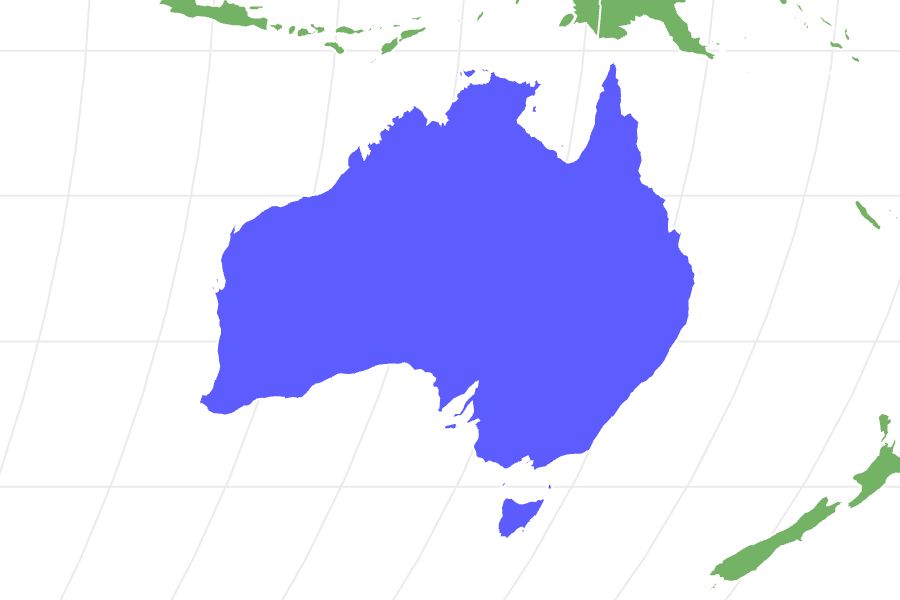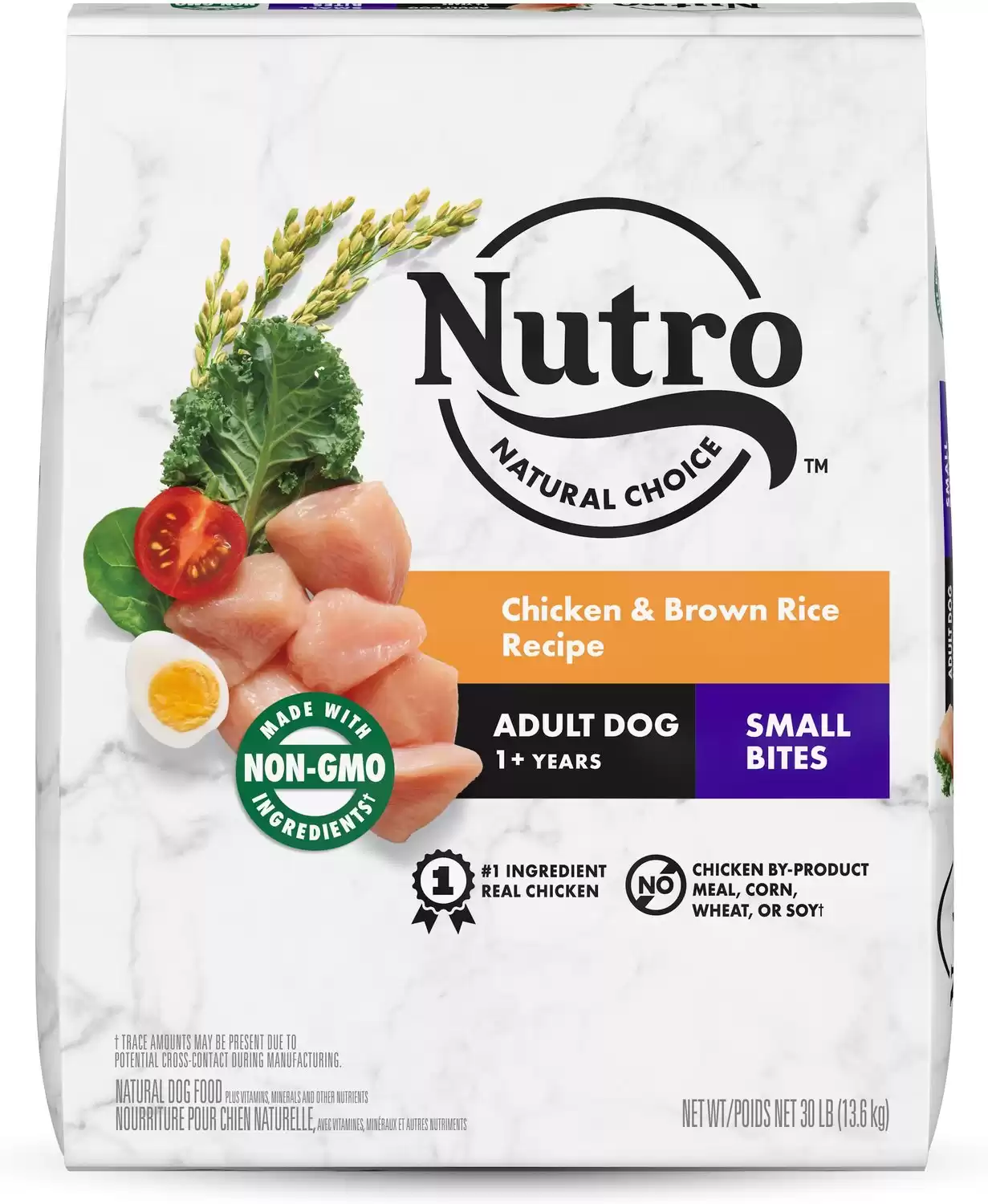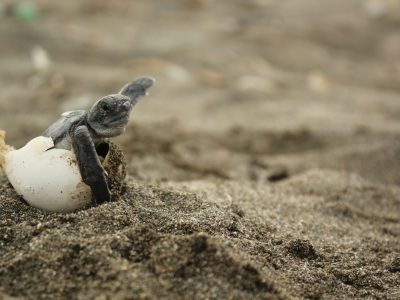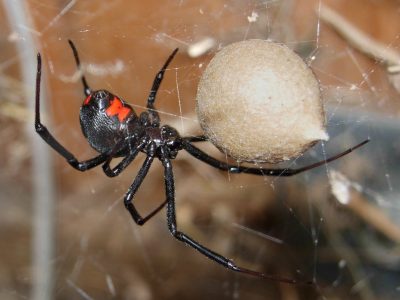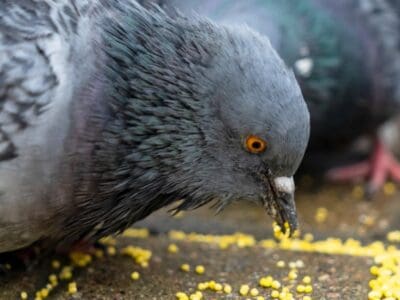Bichpoo
Canis lupus
Despite its small size, the alert nature and sharp bark of this canine make it a good watch dog.
Advertisement
Bichpoo Scientific Classification
- Kingdom
- Animalia
- Phylum
- Chordata
- Class
- Mammalia
- Order
- Carnivora
- Family
- Canidae
- Genus
- Canis
- Scientific Name
- Canis lupus
Read our Complete Guide to Classification of Animals.
Bichpoo Conservation Status
Bichpoo Facts
- Fun Fact
- Despite its small size, the alert nature and sharp bark of this canine make it a good watch dog.
- Temperament
- Energetic and intelligent
- Diet
- Omnivore
Bichpoo as a Pet:
- General Health
- Energy Level
- Shedability
- Trainability
- Intelligence
- Tendency to Chew
- Size
- Family and kid friendliness
- Yappiness / Barking
- Moderate
- Separation Anxiety
- High
- Preferred Temperature
- Warm climate
- Exercise Needs
- Moderate
- Friendly With Other Dogs
- Moderate
- Pure bred cost to own
- $1,000
- Dog group
- Non-sporting
- Male weight
- 9-18 lbs
- Female weight
- 9-18 lbs
This post may contain affiliate links to our partners like Chewy, Amazon, and others. Purchasing through these helps us further the A-Z Animals mission to educate about the world's species.
View all of the Bichpoo images!
Though the Bichpoo is small in size, these dogs are alert and bold, making them excellent watchdogs for families.
A Bichpoo is a lively, intelligent dog. It’s a mix between a Bichon Frise and a miniature poodle and is also known as the Poochon, Bichon Poo, and Bichon Poodle. Though it’s the product of two purebred dogs, the Bichpoo is categorized in the hybrid group. These dogs originated in Australia and likely date back to the 1990s when “designer dogs” were especially popular.
See all of our expert product reviews.
Bichpoos are small dogs with an affectionate, loyal temperament and a teddy bear-like appearance. They are a good match for families with children and other pets.
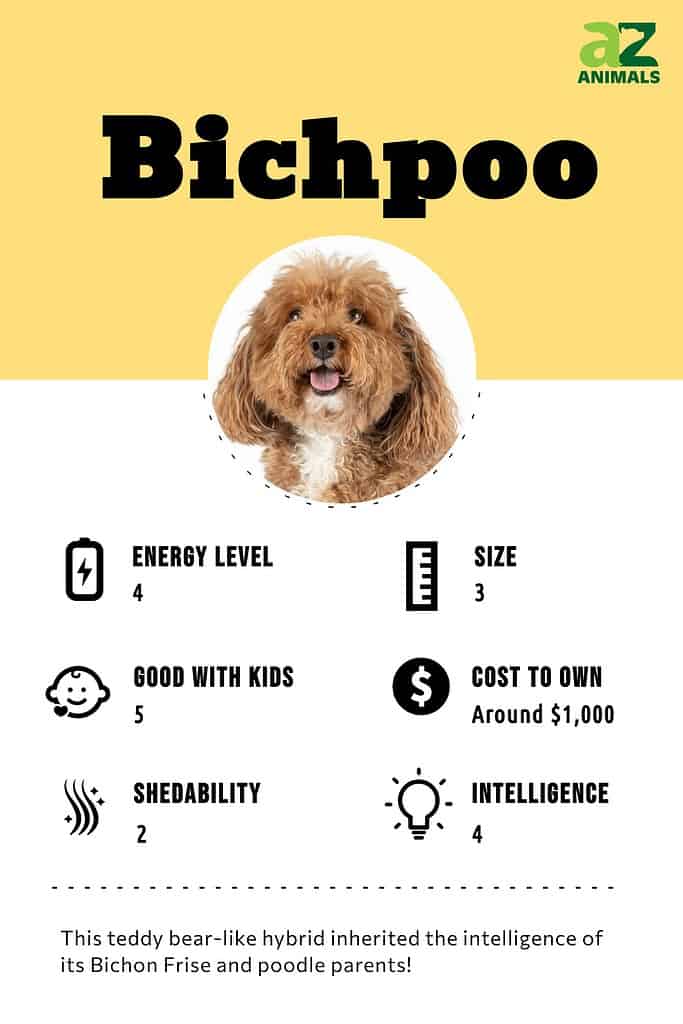
3 Pros and Cons of Owning a Bichpoo
| Pros! | Cons! |
|---|---|
| A good family dog Bichpoos are affectionate and protective so they interact well with children as well as adults. | Grooming attention needed Though it’s a low-level shedder, this dog’s coat does need grooming attention to prevent mats and tangles. However, some owners enjoy the daily grooming process! |
| Apartment-friendly This dog is small in size and a suitable pet for someone who lives in an apartment. | Moderate exercise necessary Bichpoos need at least 30 minutes of exercise each day to maintain both their physical and mental health. |
| Low shedding Though it’s not strictly hypoallergenic, it is still a low-shedding dog. So, it would be a good choice for someone with allergies. | May bark a lot A Bichpoo that’s not socialized can bark an inordinate amount. But this behavior can be adjusted with training. |
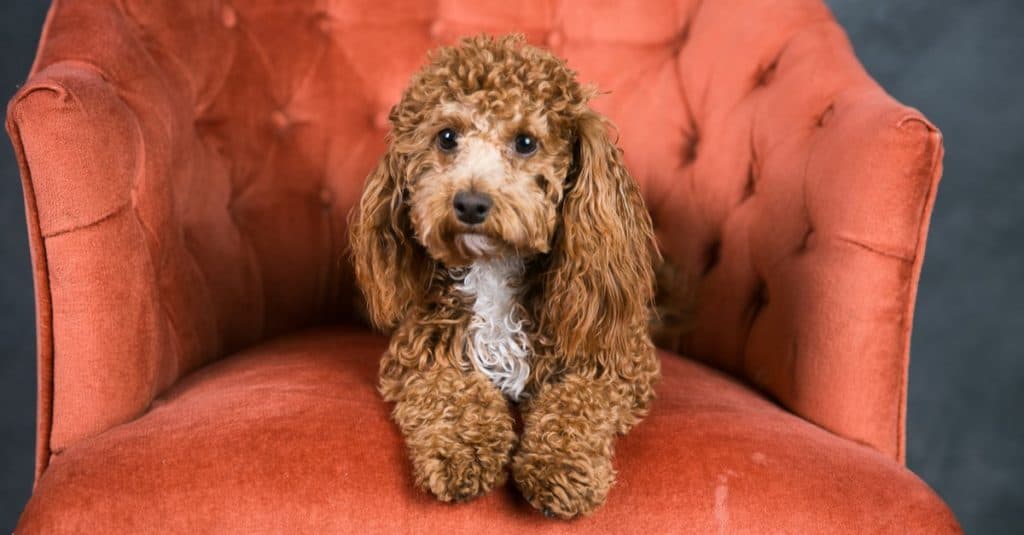
The small size of the Bichpoo means it makes a good pet for those who live in apartments.
©Ursula Page/Shutterstock.com
Size and Weight
Both male and female Bichpoos can grow to be 15 inches tall. Also, males and females can weigh as much as 18 pounds, full grown. A 9-week-old Bichpoo weighs around 2 pounds. They are considered full-grown at around one year old.
| Height (Male) | 15 inches tall |
| Height (Female) | 15 inches tall |
| Weight (Male) | 18 pounds, full-grown |
| Weight (Female) | 18 pounds, full-grown |
Evolution and History
Due to being a hybrid breed, the history of the Bichpoo is generally unknown. However, while it may have been present naturally, it’s likely that the breed was intentionally developed in Australia in the 1990s possibly as part of the wave of “doodle” breeding following the success of the labradoodle. The breeders’ aims could have been to create an intelligent, playful, small family-friendly dog with a non-shedding coat and to reduce health issues often tied to purebreds and inbreeding. As the Bichpoo’s popularity grew, breeding spread to the U.K. and U.S.
Health and Entertainment for your Bichpoo
See all of our expert product reviews.
It’s thought that parent breed the Bichon Frise began on the island of Tenerife, the largest of the Canary Islands, with the Brison Tenerife the main ancestor of today’s Bichon Frise. Once used for trading, these lapdogs have a long association with royalty and around the 13th century could be found in the royal courts of Italy, France, and Spain.
The Bichpoo’s other parent breed, the poodle can trace its lineage to the 1400s in Germany. Originally used to help hunt ducks due to their intelligence and gentle bite in retrieving birds, the poodle also became a favorite of royalty and beloved in France, where it was named the French national dog in 1786. Smaller breeds were developed, with the miniature poodle often serving as a truffle hunter and the toy poodle enjoying life as a lap dog to the rich.
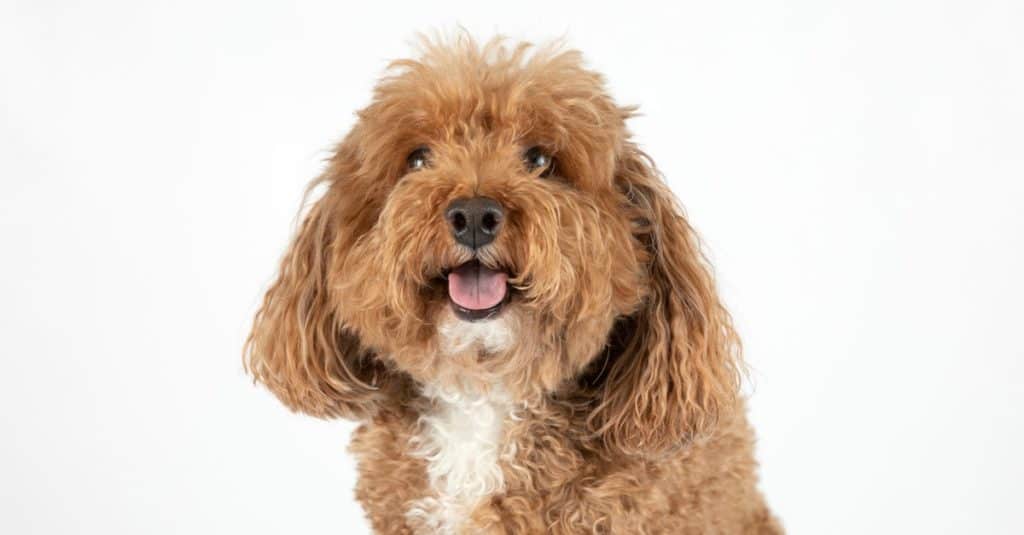
It’s believed the teddy bear-like Bichpoo was developed in Australia in the 1990s.
©Ursula Page/Shutterstock.com
Common Health Issues
Bichpoos have a few common health issues such as Cushing’s disease. A canine with this condition produces too much cortisol which can affect the animal’s ability to fend off infections and maintain a balanced blood sugar level. Some signs of this include fatigue, excessive thirst, and a potbelly. Cushing’s disease can be addressed with surgery in some cases.
Another common health issue is progressive retinal atrophy. This condition affects cells in a dog’s eyes causing partial or total blindness. A dog that has trouble seeing things at night may have this condition. Unfortunately, there’s no known treatment. A third common health issue is patellar luxation. Patellar luxation is essentially a dislocated kneecap. It can cause a dog to limp or lose its full range of motion. Physical therapy or surgery are two possible treatments. The most common health issues of this dog include:
- Cushing’s disease or syndrome
- Progressive retinal atrophy
- Patellar luxation.
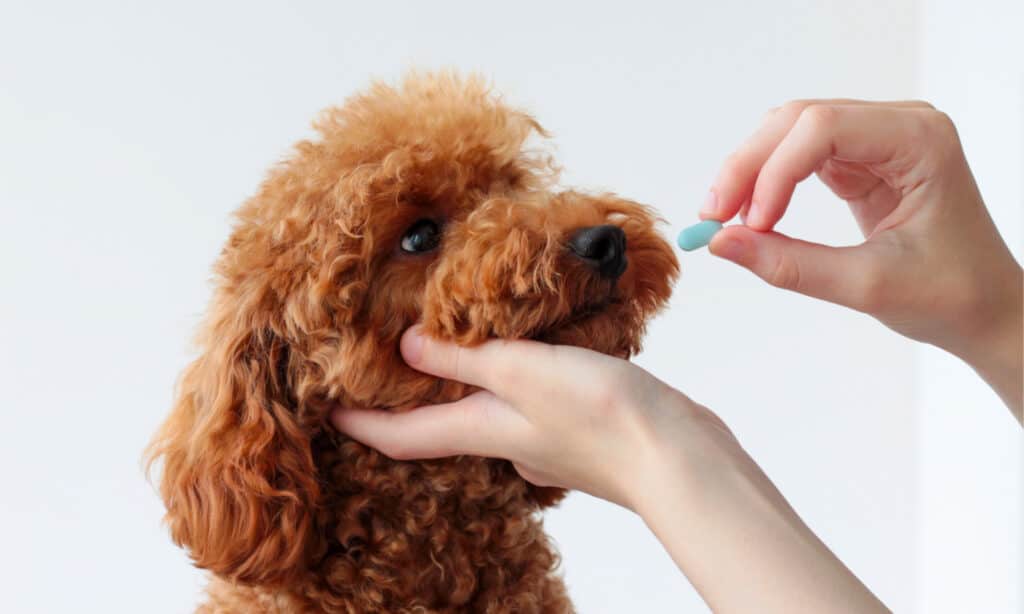
Poodles and Bichpoos have similar health issues, including being prone to Cushing’s disease.
©Varvara Serebrova/Shutterstock.com
Temperament and Behavior
The word lively goes a long way in describing a Bichpoo’s personality. These small dogs are playful, have big amounts of energy, and are always up for a game of fetch or chase.
Bichpoos have an affectionate nature and prefer to be with their families whether inside snuggling on the couch or outside running around in the yard. They have a loyal temperament that makes them excellent watchdogs for a household. These dogs do very well in a household with children.
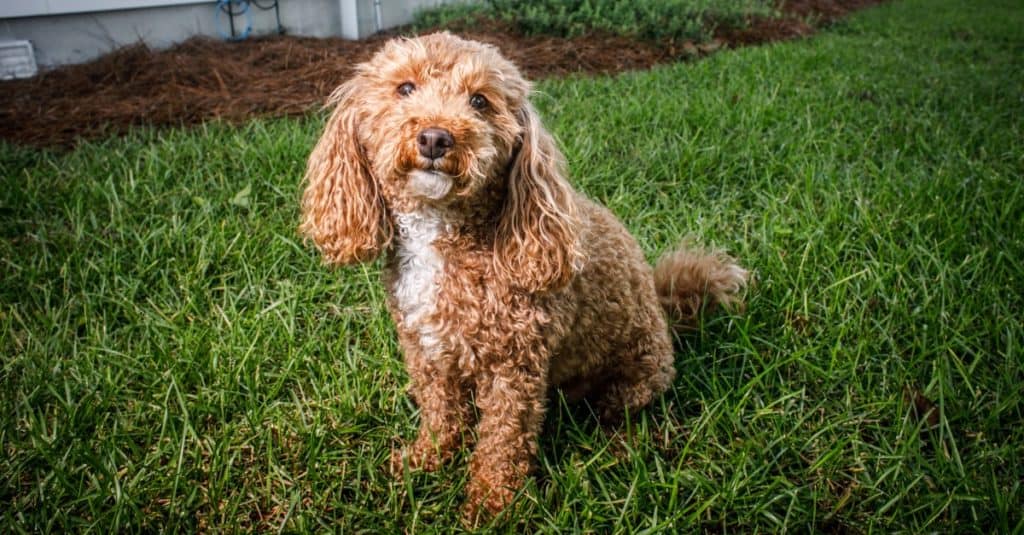
The playful Bichpoos is always up for a game of fetch in the yard.
©Ursula Page/Shutterstock.com
How to Take Care of a Bichpoo
Someone who’d like a Bichpoo as a pet should make it a point to learn as much as possible about this hybrid dog. The more an owner learns about the dietary, grooming, and healthcare needs of their puppy or adult dog, the better the person can care for the new addition to the family. Look at some factors to keep in mind.
The Best Dog Food for Bichpoos
Bichpoo puppies and adult dogs have different diets that support their own nutritional needs. Consider the diet of Bichpoo puppies and adult dogs that can help to keep them healthy.
Bichpoo puppy food: Lean protein in a Bichpoo puppy’s diet supports the growth of muscles, tendons, and tissue. Omega 3 and 6 fatty acids support the brain and eye development of puppies. This is important in a hybrid canine that is prone to progressive retinal atrophy. Calcium strengthens a puppy’s bones, teeth, and nails. It’s important for all puppies to receive calcium in their diet, but especially those prone to patellar luxation. Fiber contributes to a puppy’s proper digestion.
Bichpoo adult dog food: An adult Bichpoo needs protein to maintain its muscles, joints, and tendons. A limited amount of fat keeps this dog’s skin and coat healthy. These are small canines so an owner should certainly monitor the amount of fat in their dog’s diet. Vitamin C keeps an adult Bichpoo’s immune system healthy and vitamin A contributes to eye health. This is a helpful weapon against progressive retinal atrophy. Calcium keeps bones and teeth strong in this active dog.
Cushing’s disease in Bichpoos is normally the result of a tumor in the pituitary or adrenal gland. Organic dog food is the perfect way to circumvent potentially harmful artificial additives and minimize the risk of Cushing’s and other common health problems.
Bichpoo owners would do well to feed their dogs Nutro Natural Choice Natural Adult & Senior Dry Dog Food for Small & Toy Breeds.
This natural food with organic ingredients contains calcium and chicken as a quality source of protein for strong bones and joints. Plus, it provides fiber, and vitamins A, C, E, and B.
Check Chewy and Amazon for this product.
- Contains non-GMO ingredients, high-quality protein, and healthy whole grains
- Also has essential antioxidants to support skin, coat, and immune system
- No fillers or preservatives, only natural ingredients
Maintenance and Grooming
How much does a Bichpoo shed? Though this dog is sometimes called hypoallergenic, it does shed a low amount of hair.
The grooming routine of a Bichpoo requires daily brushing. This helps to keep mats and tangles from forming and taking a firm hold in the dog’s short, curly coat.
A slicker brush is a helpful grooming tool for this hybrid dog. A slicker brush removes loose and dead hair from the coat. The slicker brush can also be used to remove tangles and mats. Be sure to avoid pulling in a harsh way at tangles and mats. This will cause the dog to be afraid of being brushed and it will lose trust in its owner. Instead, an owner should use their fingers to gently loosen the tangle. Next, work to remove the tangle using short strokes of the brush.
An owner who is not confident about grooming their Bichpoo may want to consider taking it to a professional groomer. A reputable dog groomer understands how to remove tangles and mats in an effective way that doesn’t cause the dog pain.
Some Bichpoos suffer from environmental or food allergies. Redness, dry skin, and bald patches in its coat are all possible signs of allergies in this dog. A veterinarian has tests that can pinpoint a dog’s allergies which can lead to an effective diagnosis and treatment plan.
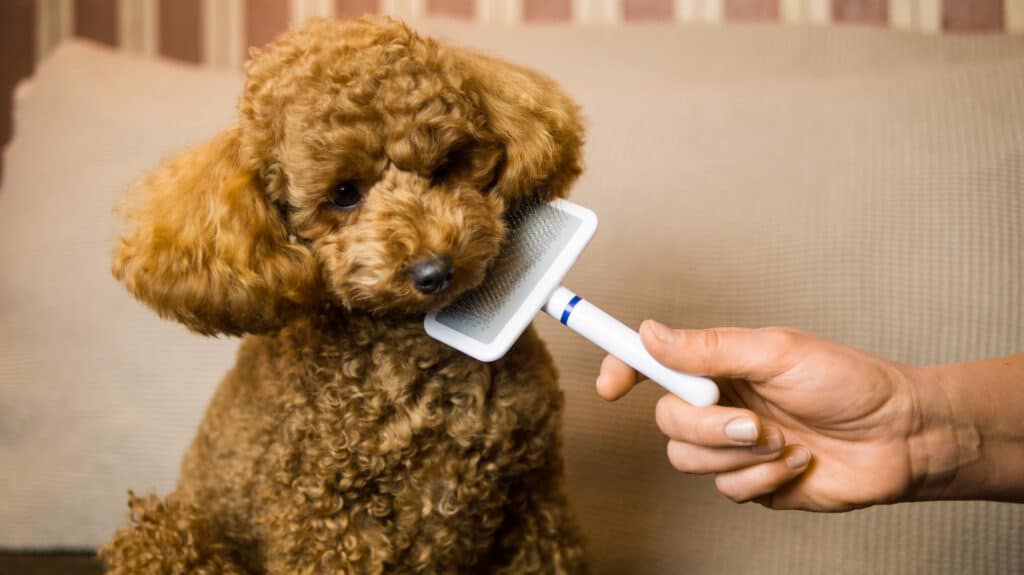
A slicker brush, shown grooming a poodle, will work well for Bichpoos.
©Kristina Arba/Shutterstock.com
Training
Bichpoos are relatively easy to obedience train. This hybrid inherited the intelligence of its Bichon Frise and poodle parents. This helps them absorb lessons during training. As a note, their high level of intelligence means they get bored easily. So, it’s a good idea for an owner to keep training sessions short.
A Yorkie-Poo is another hybrid that is smart and easy to train. They can be easily distracted as well and do best with short training sessions.
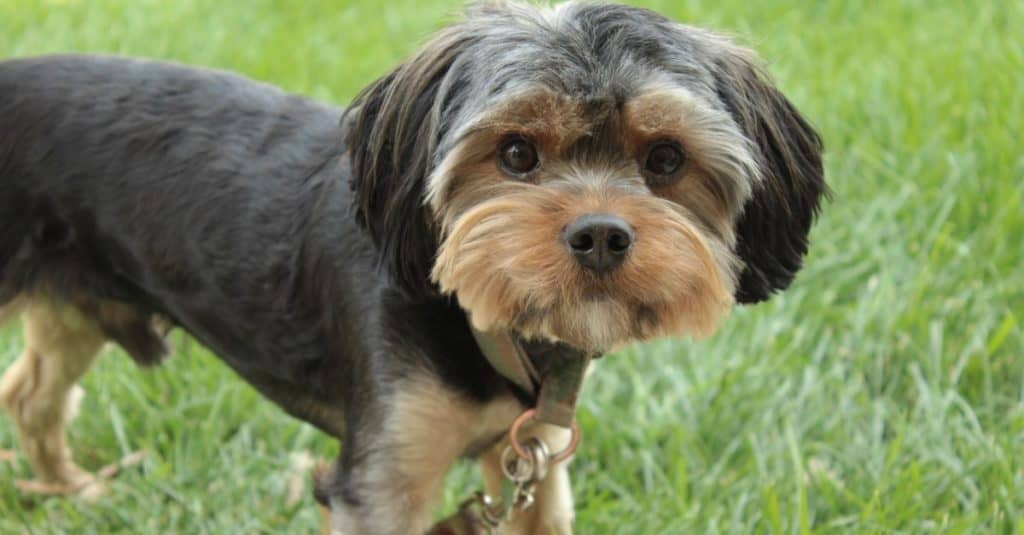
Another hybrid breed, the Yorkie-Poo, is like the Bichpoo in that it does best with short training sessions.
©Melli ah/Shutterstock.com
Exercise
Bichpoos need at least 30 minutes of exercise daily. Unfortunately, when these pooches don’t receive enough exercise, they can become anxious. Anxious dogs have a tendency to be destructive of items in a home. So, playing chase in the backyard, going for a lively walk in the neighborhood, or visiting a dog park are all activities that can help them burn energy.
These dogs are small in size and appropriate for apartment life as long as they receive daily exercise.
Puppies
Bichpoo puppies are very small. This makes it all the more important to allow them to exercise in a secure, fenced-in area. That way, they can stretch their legs and explore while staying away from traffic, larger pets, and other dangers.
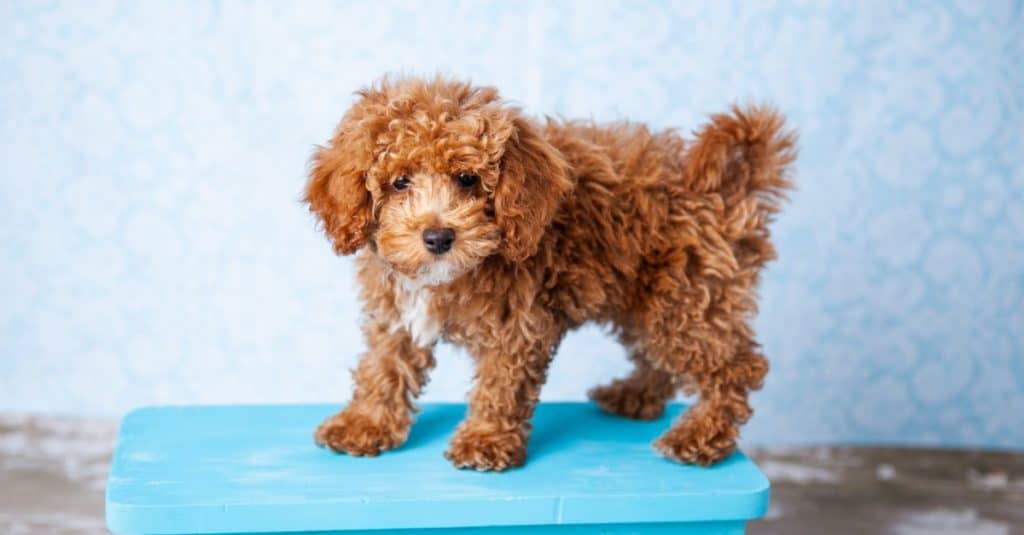
Bichpoo puppies are small so it’s vital that they play and exercise in secured areas to reduce danger.
©Ursula Page/Shutterstock.com
Bichpoo and Children
Socialized Bichpoos are good dogs for families with children. They are protective and are likely to form a bond with the kids in a household.
Dogs Similar to Bichpoos
Some dogs similar to Bichpoos include Yorkie-Poos, Toy Poodles, and Peekapoos.
- Yorkie-Poos: Yorkie-Poos are intelligent and energetic like Bichpoos. Yorkie-Poos are smaller in size than Bichpoos.
- Toy Poodles: Like Bichpoos, these dogs are smart, active, and loyal. However, Toy Poodles are not as suitable for homes with children because they become nervous in noisy environments.
- Peekapoos: Peekapoos and Bichpoos like to be with their families most of the time and suffer from separation anxiety. One difference between these dogs is Peekapoos are difficult to train.
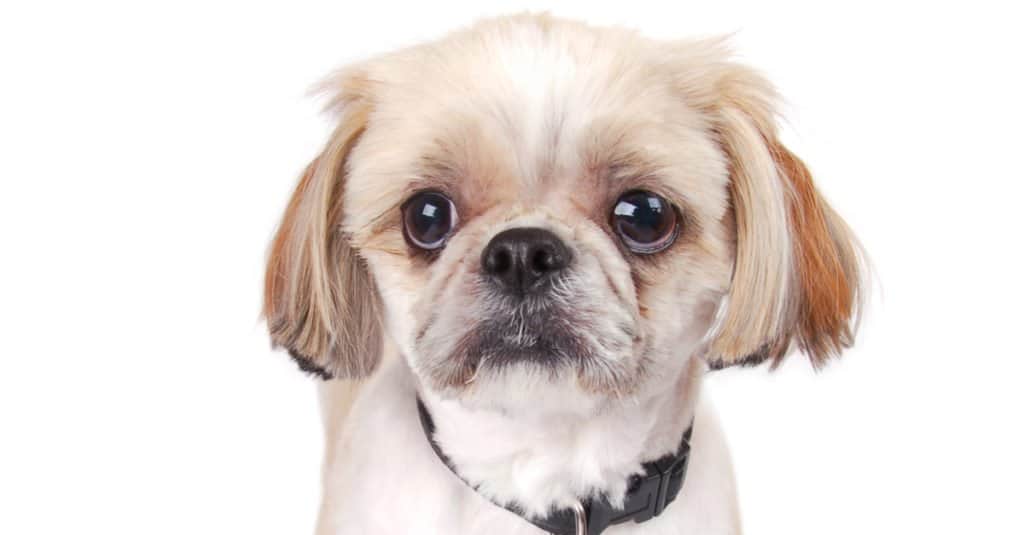
Peekapoos are similar to Bichpoos in that they like to be with their families most of the time.
©Perry Harmon/Shutterstock.com
Popular Names for Bichpoos
Popular names for these dogs include:
- Coco
- Jasmine
- Dustin
- Finn
- Jack
- Gigi
- Twiggy
- Zoey
Bichpoo FAQs (Frequently Asked Questions)
What is a Bichpoo?
A Bichpoo is a hybrid dog. It’s the result of breeding a Bichon Frise and a miniature poodle. They are friendly, affectionate, and loyal dogs that are good with children. A full-grown Bichpoo can weigh as much as 18 pounds and reach 15 inches tall. The appearance of a Bichpoo puppy depends on whether it has inherited more qualities from its Bichon Frise parent or its miniature poodle parent.
Bichpoo puppies are considered an f1b hybrid. The term f1b refers to the fact that the parents of this hybrid are purebred. F1b lets people know this is the first generation of puppies.
How much does a Bichpoo cost to own?
Bichpoo puppies for sale by breeders are priced at around $1,000. Of course, one breeder may have Bichpoo puppies for sale at a lower price than another breeder down the street.
The yearly veterinary costs of a Bichpoo range from $300 to $500.
The monthly food costs for this small dog range from $50 to $75. This can vary depending on the amount of food purchased at one time and the price of the brand.
Is a Bichpoo good with kids?
Yes. This affectionate dog is known to be good with kids.
How long does a Bichpoo live?
The lifespan of a Bichpoo is 12 to 15 years.
How big does a Bichpoo get?
A Bichpoo can grow as tall as 15 inches and weigh as much as 18 pounds.
How much does a Bichpoo cost?
Bichpoo puppies raised by breeders are usually for sale at a price of around $1,000. It’s worth a person’s time to check the local Bichpoo rescue organization to look over the puppies and adult Bichpoos available for adoption. The reasonable price a person pays to adopt a Bichpoo is going to help support the organization’s daily operations.
Are Bichpoos hypoallergenic?
No, they are not hypoallergenic. These dogs are low shedders, so they are a suitable choice for an owner with allergies.
Do Bichpoos bark a lot?
A socialized Bichpoo doesn’t bark a lot. But they are alert dogs that will bark if there’s a knock at the door or they see a stranger on the property. This is a must-have quality in a watchdog!
Thank you for reading! Have some feedback for us? Contact the AZ Animals editorial team.
Sources
- Rover, Available here: https://www.rover.com/blog/surprising-facts-about-the-poochon/
- Pet MD, Available here: https://pets.webmd.com/dogs/cushings-syndrome-dogs#1

